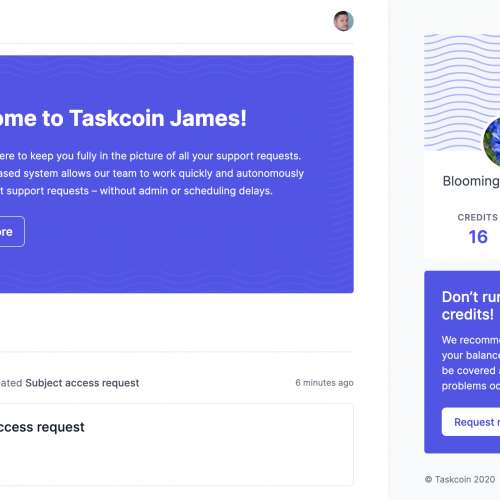Since we started investing in startups, we’ve been trying to figure out the best way to share the success of our portfolio with our team. They work hard to help our portfolio startups and we believe they should be rewarded. We also need to make sure that our share scheme won’t impact our startups’ fundraising prospects in the future.
We’ve been working with big name accountants and lawyers for over two years to figure out the best way of creating an awesome share portfolio scheme. Over and over again we’ve seen the biggest players in the business finance game try and fail to create a shares scheme that would be tax efficient for our team.
It seemed like no lawyers or accountants were able to get their heads around the tax implications for companies like us that act like an incubator by investing in startups.
Two years later and we’ve finally got it figured out, thanks to TLT Solicitors, who stepped up to help out where no one else could.
It’s been a long journey but, with TLT’s help, we’re finally able to offer our team a share portfolio scheme that rewards their hard work on the great startups we work with, and doesn’t cause any negative impact to our portfolio.
As it’s taken us over two years to sort this, we want to share with you what we’ve learned. Let’s start at the beginning…
Simpleweb shares and the EMI scheme
Originally, we set up an Enterprise Management Incentive (EMI) scheme for Simpleweb.
With the EMI scheme, employees don’t get stock in the company, but share options. This means that employees have the right to buy the shares in the future at the price they were valued at when the options were allocated. The more the shares increase in value over time, the more capital gain (or profit) the team can expect should they exercise (or buy) their options.
The EMI scheme is really popular among small businesses. Employees don’t pay any tax when they exercise their shares and will only have to pay capital gains tax if they go on to sell those shares for more than the market value when they were granted.
The EMI scheme is perfect for rewarding our employees with a piece of Simpleweb, but once we started investing in early stage startups, things started to get tricky…
The problem
We have three types of investments in our portfolio:
- Incubated companies where Simpleweb owns more than 10%
- Incubated companies where Simpleweb owns less than 10%
- Spin off companies and joint ventures
The amount of equity we have in each company has a big impact on how different share schemes will affect Simpleweb and our employees. Each of the three types of investments listed above needs to be handled differently.
We’re going to take a look at the barriers we faced with each type of investment and how we’ve decided to tackle each one.
Incubated companies
Where Simpleweb owns more than 10%
One of the main problems we faced was that we didn’t want our employees to get taxed twice.
If Simpleweb receives a payout from an incubated company where we own more than 10% (so as to benefit from a tax exemption known as ‘substantial shareholding exemption’ or SSE), any gain arising on the sale of those shares will be exempt from corporation tax.
This means that the funds flowing into Simpleweb from the sale of a portfolio company are not taxed and can therefore be passed on as a dividend or held in the company to increase the value of Simpleweb. Employees benefit from either option.
This means that the EMI scheme is the most tax efficient way for our team to benefit from our investments in companies where we own more than 10%.
Where Simpleweb owns less than 10%
Where Simpleweb owns less than 10% of an incubated company, any return on sale of the shareholding won’t benefit from SSE. This means that money flowing into the company would be taxed as part of Simpleweb’s profit. Any subsequent payment out of Simpleweb as dividends would also be taxed in the hands of any employee shareholders.
This led us to think about whether there was a better way to share with our team any payout for these companies.
First, we thought the nominee beneficiary structure would work best. This is the model used by many crowdfunding platforms, where one company (like Simpleweb, or a crowdfunding platform) holds and manages the shares on behalf of the investor (the Simpleweb team or crowdfunding investors). This is a great, easy to understand blog post on the nominee beneficiary structure from Seedrs if you want to find out more.
The nominee beneficiary structure seemed like the perfect solution, until VCs got involved. The structure would confuse everything for other investors in the startups in our portfolio, including articles of association, shareholders agreements and other key documentation.
To keep the investors and our portfolio companies happy, we dropped the nominee beneficiary structure, which set us back another few months in our search for the perfect shares portfolio scheme…
Finally, we settled on offering our team ghost stock, or phantom stock. This means we can offer them the economic value of equity, but not the equity itself.
In other words, the team would get their payout in the form of a bonus. Unlike dividends, the team would have to pay PAYE and national insurance on the bonus, as they do with salary.
Spin off companies and joint ventures
For companies that have spun out of Simpleweb, or are joint ventures with another group, we’re able to give our team straight up stock. No options, no ghost stock, but actual shares in the company.
Our New Shares Portfolio Scheme
It’s a bit more complicated than we’d originally hoped (but a lot less complicated than some lawyers were suggesting!), but we finally have a share portfolio scheme that rewards our team and keeps our investments happy.
- For incubated companies where Simpleweb owns more than 10%, our team will get the benefit through the EMI scheme.
- For incubated companies where Simpleweb owns less than 10%, our team get ghost stock, so instead of getting actual equity, they get a nice bonus worth the same value as the equity they would have had when Simpleweb gets a payout.
- For spin off companies or joint ventures, our team gets actual stock.
It’s been a long journey but we’re now happy to start sharing the success of our investments with the team who make it happen.
We’re currently building an app to help our team manage their shares portfolios, we’ll keep you posted on that here!
Simple glossary
These terms have been simplified for the sake of this blog post.
Article of association: Written rules about running the company agreed by the shareholders, directors and the company secretary.
Capital gain: Profit from a sale (in this case the sale of shares).
Capital gains tax: a tax charged on profit from the sale of an investment.
Dividend: A sum of money regularly paid by a company to its shareholders out of its profits.
Enterprise Management Incentive (EMI) scheme: Employees are offered share options which they can purchase in the future for the price they were valued at when the options were granted.
Exercise: Buy shares that have been allocated to you as share options at the price laid out in the share options agreement contract (in this case, the value of the shares at the time the options are allocated).
Ghost stock, or phantom stock: A company offers the economic value of equity in the form of a bonus, but not the equity itself.
Nominee Beneficiary Structure: The model used by many crowdfunding platforms, where one company holds and manages the shares on behalf of the investor.
Shares: Equal parts into which a company’s capital is divided. How many shares a shareholder owns determines what percentage they get of the company’s profits.
Share options: Share options give employees the right to buy shares at an agreed-upon price within certain time constraints.
Shareholders agreement: A contract between the shareholders of a company.
Stock: The capital raised by a company or corporation through the issue and subscription of shares.
Substantial Shareholding Exemption (SSE): An exemption from the assessment of capital gains under corporation tax.



